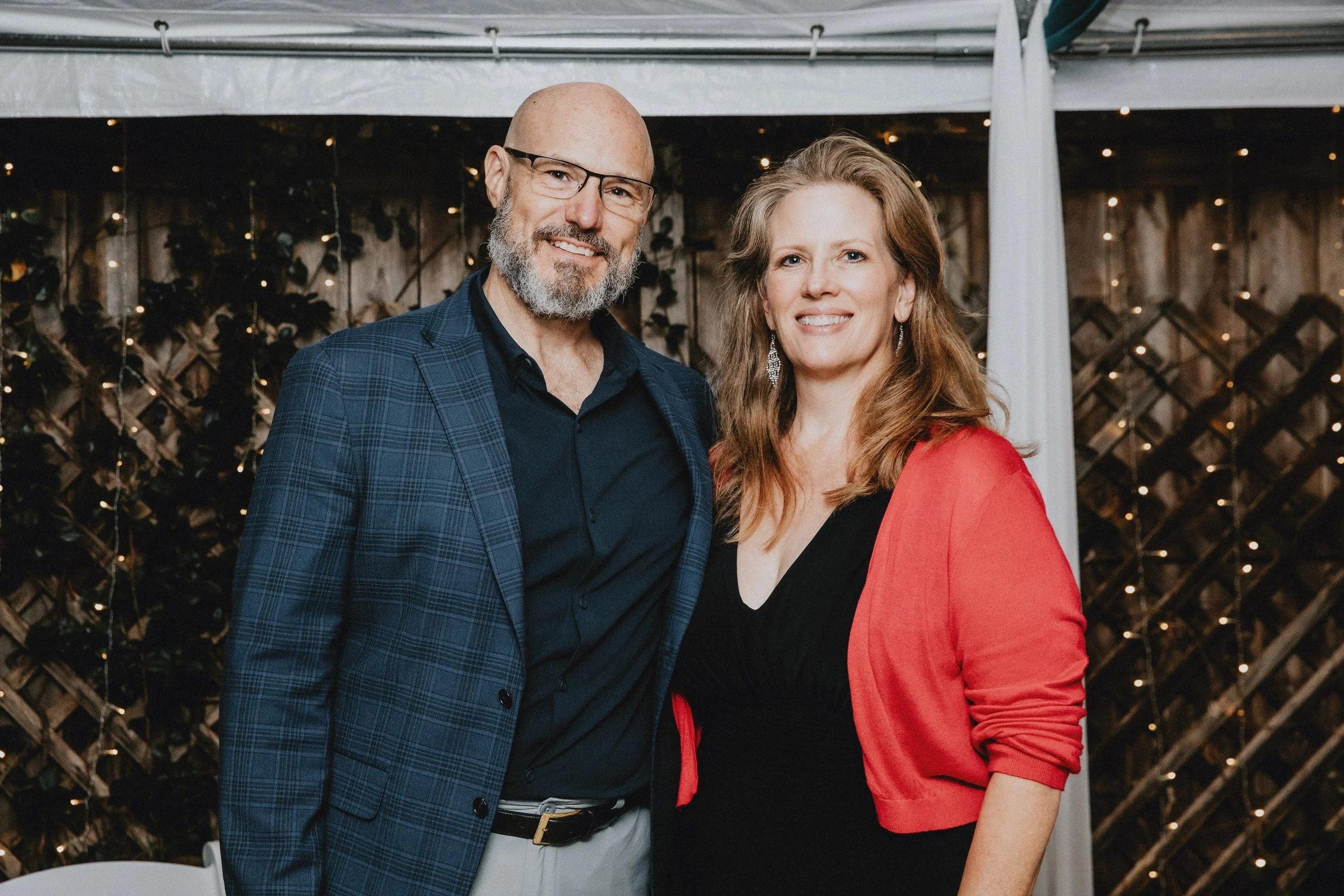Shelley Speaks: What I’ve Learned Watching a Man I Love Choose Healing
Beautiful backyard wedding in Central Austin, October 2025
by Shelley MacAllister, LMSW
We don’t talk enough about men’s mental health. You might see a joke or a meme here and there, but it’s not seriously discussed in families, acknowledged in workplaces, or respected in our culture. Men rarely speak out and say, “I’m not okay.” The numbers reflect this, too. In the United States, men account for nearly 80% of suicides, and the suicide rate for men is approximately four times higher than for women.¹
Despite this, men receive significantly less mental-health care. National data shows that men are far less likely than women to seek treatment, even when experiencing symptoms.² A 2023 review found that male university students, a group with rising mental-health concerns, were 2.3 to 2.5 times less likely to receive mental-health treatment compared to women.³
And in many ways, our cultural conversations about men haven’t helped. I remember being in college, flipping through my favorite Glamour magazine, and seeing messaging that essentially said men were “optional.” You didn’t really need them. As a mom of a boy and a girl, I loved seeing girls finally being lifted up, but at some point it started to feel like boys were being left out. The cultural response was often, “too bad, girls were overlooked for generations.”
Fast forward to today, and the messaging is just as confusing, but in different ways. In some spaces, men are expected to never struggle — to lead, endure, and stay stoic no matter the cost. In other spaces, the pendulum has swung so far the other direction that masculinity itself is treated with suspicion, where even healthy confidence gets read as a warning sign.
These extremes leave men and boys unsure of who they’re “allowed” to be, and whether reaching out is even safe. Thing is:
Men are great. I’m fortunate to know and love many wonderful men (including the one I reared!) I genuinely enjoy men who are respectful and emotionally aware. Men who are trying. Men who navigate the world with heart, aligning their behaviors with their thoughts and feelings. Men who take charge when it’s needed and have no problem falling back with the same voracity.
And that brings me to Doug.
What It Means to Witness Someone Choose Healing
I want to say something about Doug. Not from my role in our business, but from my role as someone who has faithfully walked beside him for the past 10 years.
I see how he tries. How he shows up for himself. How he takes responsibility for his mental health with courage and humility. And how he chooses, day after day, to do the quiet, unflashy work of staying well.
A lot of you know pieces of his story, the rebuilding, the reckoning, the transformation, but you may not see how much internal strength it takes to sit with your past and choose a healthier future. Behind the scenes, he works every day to stay grounded, honest, and connected. He practices what he writes about.
And the truth is: it takes real courage for a man to model mental health publicly, not as perfection, but as a process.
He didn’t have to write about the hard things. He didn’t have to share the uncomfortable parts. But he did, because he believes that if even one man feels less ashamed or less alone, it will have been worth it.
I admire him more than I can express and am so grateful to be his life partner.
And I hope that by seeing Doug talk openly about his journey, other men feel permission to reach out. To get help. To recognize that struggling doesn’t make them weak, it makes them HUMAN.
And when men model that kind of honesty for one another, it shifts the whole conversation.
– Shelley
shelley@d-degree.com
Mental Health Resources
— 988 Suicide & Crisis Lifeline (United States)
Call or text 988 | Chat at 988lifeline.org
Free, confidential support for anyone in emotional distress or experiencing a mental-health crisis.
Available 24/7 in English and Spanish.
Men don’t have to be “in crisis” to call — they can talk through stress, overwhelm, or just not feeling like themselves.
— Black Men Heal
blackmenheal.org
Provides free therapy for men of color, delivered by culturally competent therapists.
Built specifically to address the stigma, systemic barriers, and cultural pressures that keep many Black men from seeking help.
They also offer peer groups, community support, and a “King’s Corner” discussion space.
— Movember Conversations (Men’s Mental Health)
conversations.movember.com
A global program designed to help men talk openly about mental health.
Offers simple, research-backed conversation guides for men, partners, friends, and family members — especially those who aren’t sure how to start the conversation.
Focuses on real-world scenarios men face, including loneliness, job stress, and emotional withdrawal.
References
Centers for Disease Control and Prevention. (2025). Changes in Suicide Rates in the United States from 2022 to 2023. NCHS Data Brief No. 541. https://www.cdc.gov/nchs/products/databriefs/db541.htm
(Statistic: Men account for ~80% of suicides; male suicide rate ~4× higher than female.)Substance Abuse and Mental Health Services Administration. (2022). 2021 National Survey on Drug Use and Health (NSDUH) Data Brief. https://www.samhsa.gov/data/report/2021-nsduh-data-brief-1
(Statistic: Men consistently access mental-health services less often than women.)Sagar-Ouriaghli, I., et al. (2023). Improving Mental Health Help-Seeking Among Male University Students: A Systematic Review. Frontiers in Public Health. https://pmc.ncbi.nlm.nih.gov/articles/PMC10262626/
(Statistic: Male students were 2.32–2.52× less likely to receive treatment than female students.)University of Utah College of Social Work. (2023). Breaking Down Barriers to Men’s Mental Health and Wellbeing. https://socialwork.utah.edu/magazines/innovation-matters/2023/breaking-down-barriers-to-mens-mental-health-and-wellbeing.php
(Context: Cultural stigma and stereotypes reduce men’s help-seeking.)


